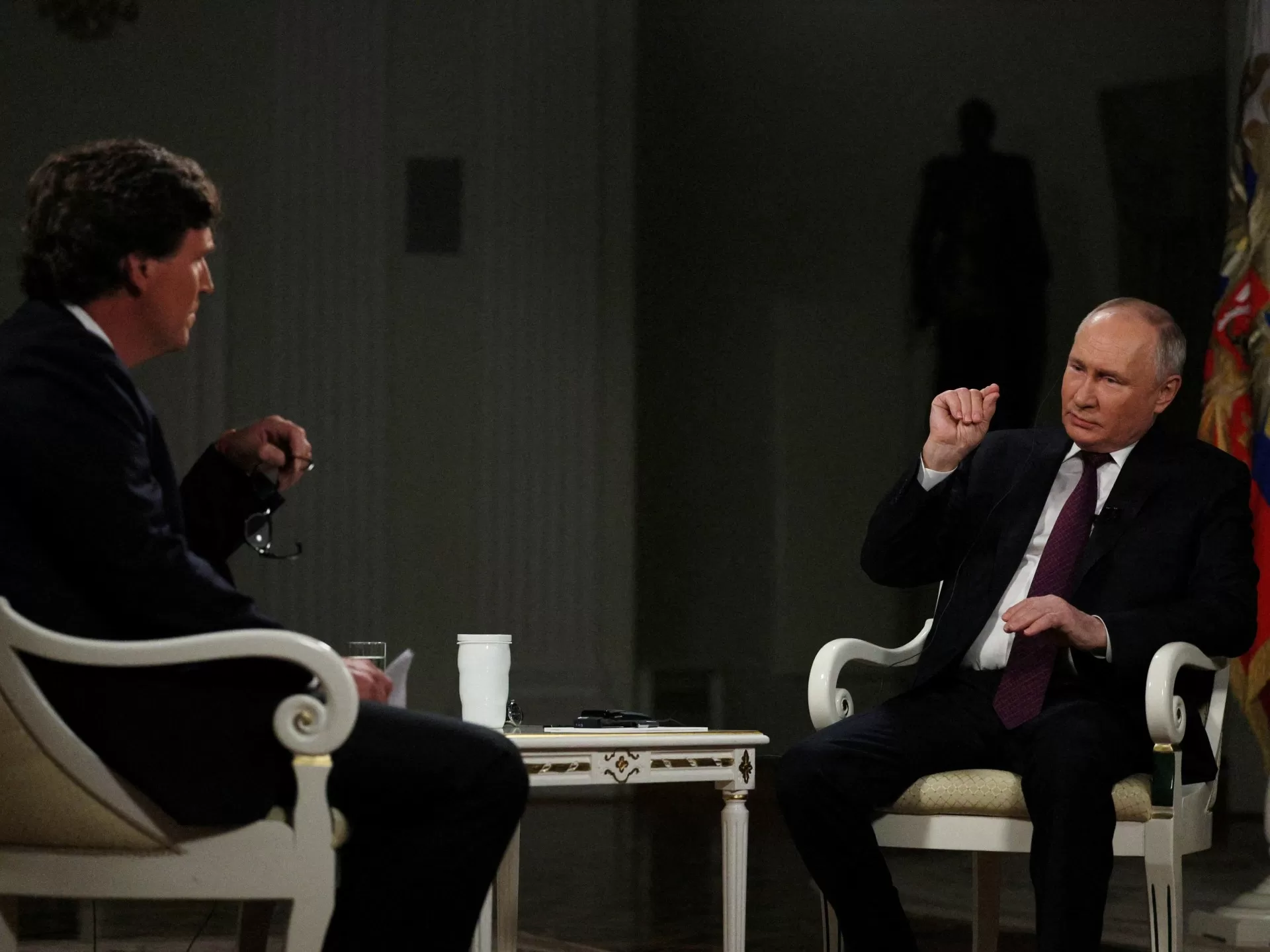The interview was met with a lot of mockery in the West, largely focused on the first part, in which Putin suggested that he would talk about Russo-Ukrainian history for 30 seconds and then went on bragging about medieval princes and long-extinct empires for a good half-hour.
Some of his claims were outright shocking, such as his suggestion that Poland precipitated World War II by failing to accommodate Hitler’s demands. Others reflected a view of history associated with Russian nationalist mythology, which is hardly worse than Ukraine’s nationalist mythology – the one which Western supporters of Ukraine tend to pass as the country’s legitimate history.
While the interview provided a lot of fodder for Western ridicule, it also contained some important messaging that Western observers ignored amid their persistent rejection of the very likely prospect that Putin will end the war in Ukraine on his own terms.
Throughout his conversation with Carlson, the Russian leader appeared to channel the sentiment of being constantly duped by the West and demonstrate a firm resolve not to be duped ever again.
The Russian president spoke of Ukraine’s invitation to join NATO, issued at the Bucharest summit in 2008. Germany and France were known to be against it at the time and only a small minority of Ukrainians supported the idea. According to Putin, US President George W Bush pushed through the decision which triggered a chain of events ultimately leading to the conflict in Ukraine.
He told Carlson that at the time he was being repeatedly assured by his German and French counterparts that Ukraine wasn’t really going to join NATO, but he had no reason to believe these assurances. If the US was able to press them into agreeing to the invitation for Ukraine, there was no guarantee it wouldn’t do it again to get the country into NATO, he said.
Later in the interview, Putin brought up the February 2014 agreement between the Ukrainian government and the opposition. Mediated by France, Germany and Poland, it was supposed to end the violence at the most dramatic point of the Maidan revolution in Kyiv. Putin said that instead of complying with it, the opposition proceeded with overthrowing Viktor Yanukovych’s government, whereupon – he maintained – the Western guarantors threw the agreement “into the furnace”.
Towards the end of his history lecture, he brought up the Istanbul talks in March 2022, which could have ended the current war in Ukraine. He claimed that he removed the troops from the surroundings of Kyiv at the insistence of Western leaders in order to facilitate the talks, whereupon the Ukrainians ditched the agreements at the behest of the West – namely British Prime Minister Boris Johnson.
The claim that the withdrawal was intentional is hardly plausible since the Russian forces in northern Ukraine were extremely stretched and suffering heavy losses from the Ukrainian army’s guerrilla tactics. They likely would have had to be pulled back anyway. But the sentiment of being duped was once again very much there and it should inform us about his further actions.
Putin appears to see the history of his relationship with Western and Ukrainian leaders as a succession of insults and betrayals, to which he has responded in his trademark heavy-handed manner: Not an eye for eye, but a punishment that grows exponentially each time the opponent shows perceived intransigence. Yet his policy, at least from his own point of view, has always been reactive, not proactive.
Whether it was in good or bad faith, the message he was trying to convey in the interview is that at each crucial point in history, Ukraine had a choice of sparing itself all the further trouble and that it still has this choice now. He is ready for talks. A few times in the interview, he ridiculed Ukrainian President Volodymyr Zelenskyy for banning himself from talking to Putin by a presidential decree. He urged his Ukrainian counterpart to cancel that decision.
Putin’s endgame appears to be getting an agreement along the lines of what has been tentatively achieved in Istanbul, but this time with all the territories which Russia occupied and formally annexed after these talks fell through. The implied threat is that Ukraine will lose even more territory – not to mention lives and infrastructure – should it keep being stubborn.
What Putin is trying to achieve is making the West face its moral dilemma which boils down to the cost and benefit of resisting his aggression. The continued support for Ukraine’s military effort will cost thousands of lives and devastate Ukraine even further, while success is hardly guaranteed.
The stakes do not seem to be in Kyiv’s favour as things stand now: Russian troops are advancing all along the front line and the US military aid to Ukraine is in jeopardy due to the resistance from the Republicans.
But getting back to the Istanbul framework means a clear defeat for both Ukraine and the West, no matter how hard all the spin doctors and troll farms will try to frame it as a victory.
More than anyone else, it will be the Ukrainians who will be asking what was all this enormous sacrifice for when it was possible to sign a deal in Istanbul back in March 2022 or to implement the Minsk agreements, which Zelenskyy publicly dismissed as “vapid” days before Putin ordered his troops to march on Ukraine.
If the situation does not miraculously change, at the moment Ukraine looks very far from getting any semblance of what was envisaged in Minsk or Istanbul and it is drifting further towards misery. The mockery of Putin’s interview will, of course, continue in a hermetic echo chamber that has long parted ways with reality.
The views expressed in this article are the author’s own and do not necessarily reflect Al Jazeera’s editorial stance.
